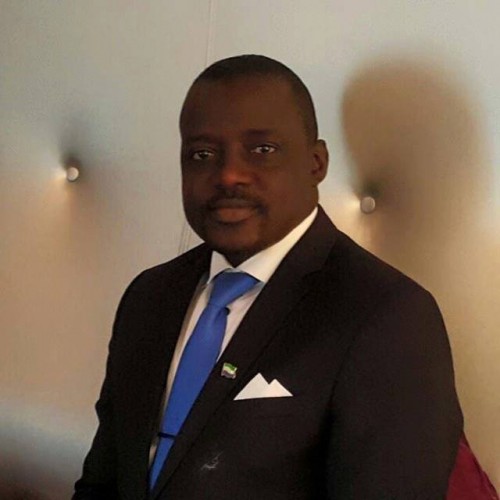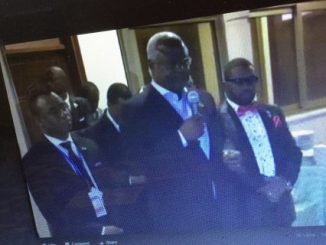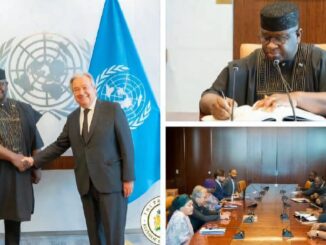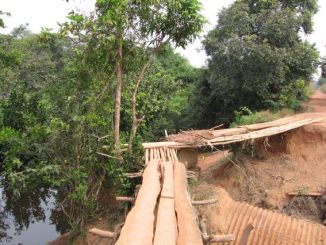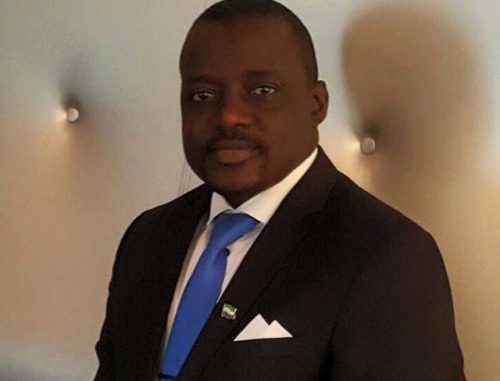
National News Agency – Sierra Leone’s Minister of Information tells NNA looking forward to boosting media cooperation with Lebanon, hails role of Lebanese Diaspora buoying economy
NNA – The newly appointed Minister of Information and Communications of Sierra Leone, Mr. Mohammad Bangura, is a renowned media practitioner and media owner. Now that he has assumed his duties as MoIC, the media landscape of Sierra Leone is pining great hope on having Mr. Bangura amend relations between the country’s journalists association and the government.
“Media is an interesting cause in my life. I did my studies in Canada, and I have an honors degree in Mass Media Communication. I returned to Sierra Leone back in 2006, and I currently have my own newspaper,” Bangura said in an interview accorded to the National News Agency.
Mr. Bangura is currently in Lebanon, along with Sierra Leone’s Vice President, Bockarie Foh, and Minister of Foreign Affairs of Sierra Leone, Samura Kamara, marking the inauguration of the Honorary Consulate of Sierra Leone in Saifi, Beirut.
“The media landscape is a bit different in Sierra Leone because of the economic problems that the nation endures. There are a lot of difficulties when it comes to independent media. The economic trends of the media sometimes cause a lot of compromises. When we take a look at advertisements in Sierra Leone, we notice that very few people do commercial advertisements, and this is due to the fact that most of the commercial advertisements are made by the government,” the Minister explained as giving a closer look at the way the media industry functions in Sierra Leone.
“There is a strong tendency for the media landscape to practice self-censorship in a bid to maintain the trust of the sides that provide them with economic support. Coming from a media background, I have decided to become a politician, and this has been a very easy transformation for me. I have a lot of friends within the media sector, a lot of good will, and a lot of publicity. All of these factors have provided me with a very easy transformation process,” Mr. Bangura said.
Touching on the relationship between the media and the government in Sierra Leone, Mr. Bangura described it as “shaky”, blaming it all on the country’s political trends, which control most of Sierra Leone’s newspapers.
“Our country’s media landscape is too politically entrenched. We have eleven political parties in Sierra Leone, two of which are run by major political parties. Each of these two major political parties has a media influence within the media landscape. Due to the lack of training and exposure, as well as lack of economic exchange, the independent media suffers some difficulties, and it has to abide by the law. Private media is consistently being reported at the Criminal Investigation Department (CID); however, most of these cases have nothing to do with the government, but rather more with lack of professionalism. With my background and my close relationship with the media, this will change,” Mr. Bangura pledged, disclosing the fact that he will also be working hard on abolishing the 1965 Public Order Act of Sierra Leone once a better alternative is found.
The Sierra Leone Public Order Act of 1965 (POA) appears to provide the Government great latitude in criminalizing criticisms, comments or opinions that the Government dislikes or finds unduly critical of its policies.
Sharing his primary goal as Sierra Leone’s Minister of Information and Communications, and the changes he’s planning to make to improve this sector, the Minister said: “When we talk about the Ministry of Information and Communications, people think it’s all about promoting the government’s policies. I would so much like to steer clear from this trend. I have a Deputy Minister and a Director of Communications who function within the MoIC. Sierra Leone also has a presidential spokesman who will be looking at the government’s policy towards the people. I am looking forward to boosting the role of Information and Communications Technology ICT, a move that will sure help our country prosper. ICT will also help the country open to outside communication. Thank God we have Fiber optics technology in our country, a thing which makes it easier for us to communicate with the outside world.”
The Minister went on to share his plans to give the kiss of life to Sierra Leone’s Broadcasting Corporation and Sierra Leone’s News Agency.
“My first 90 days as Minister of Information and Communications I will make sure to resuscitate both media outlets. I also want to bring the association of journalists very close to the government – perhaps by initiating an annual dinner to get journalists to sit with the president in a peaceful atmosphere and a close human bond,” Mr. Bangura said.
Concerning the Ebola outbreak in Sierra Leone and the economic blow that the region had suffered due to this ghastly disease, the Minister confirmed that his country has finally managed to “put Ebola aside”.
“Prior to Ebola, our economy was one of the best, and then Ebola struck out of nowhere. Thank God we have managed to put Ebola aside; the country’s economic wheel is moving again. We are now open again to foreign investors, and we are looking forward to letting the world know about our unmatched beaches. We also have a landscape that is so suitable for touring couples. Sierra Leone boasts the second biggest harbour in the region, not to mention some of the most successful businesses in the world.”
As for the role of the Lebanese Diaspora at the economic and social levels, the Minister described it as “amazing”.
“The Lebanese community has played an essential role in the country’s development. When Ebola struck, the Lebanese offered a huge amount of donations. The Lebanese own small and big scale businesses in Sierra Leone and they employ locals to work with them. The Lebanese are also in the mine industry, as well as in the import and export industry. The Lebanese have turned our economy around and this is why we are here today opening a consulate in Lebanon. In the near future we plan to open a permanent embassy in Lebanon.”
Explaining the reason why it took his country so long to open a consulate in Lebanon, Mr. Bangura said that was all a “resources” issue.
“Ours is a very fragile economy. Setting up a consulate requires a big budget,” he clarified.
Mr. Bangura finally hailed the close existing relations between the media outlets of Sierra Leone and those of Lebanon.
“In the future, I want to see stronger ties between Lebanon and Sierra Leone. I’m looking forward to initiating exchange programs with the National News Agency, which we hope will help raise the standards of our local news agencies.”

